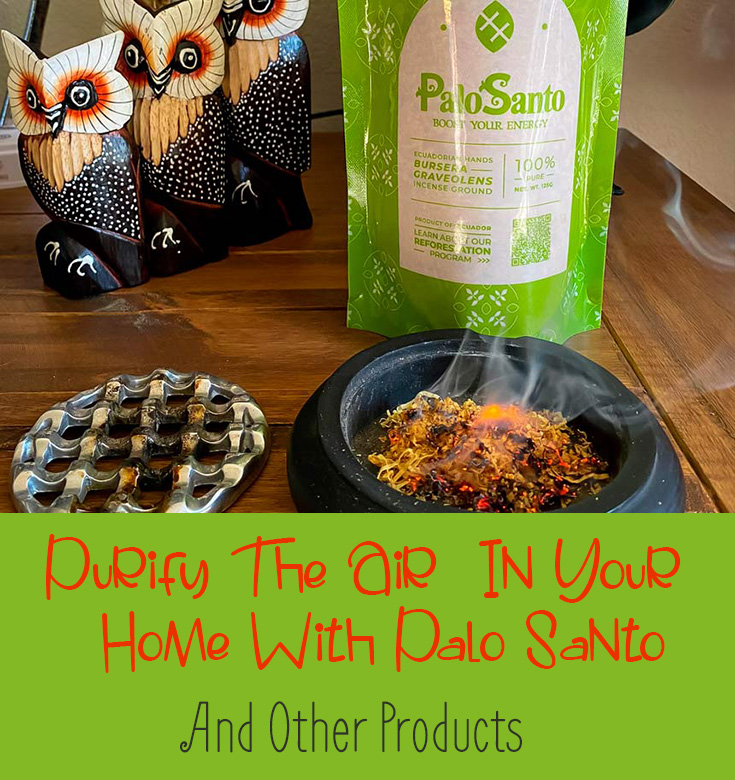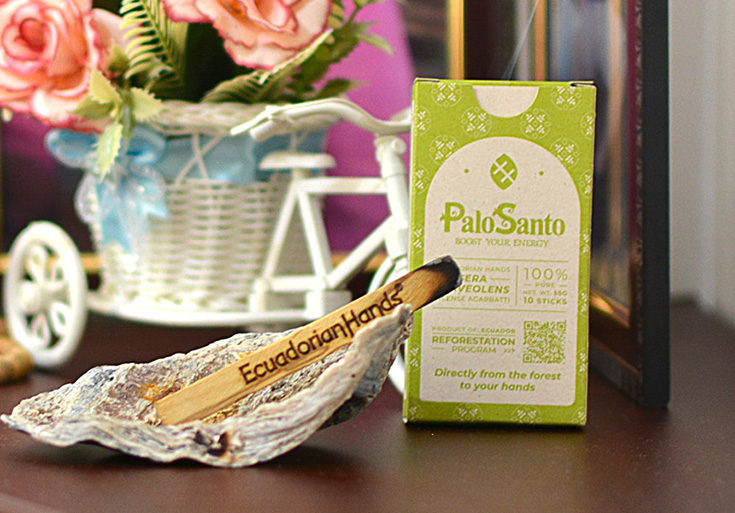Did you know that the air we breathe indoors is usually much more polluted than the air outdoors? It may surprise you, but it’s true. In our homes, there are certain products that can be harmful to us and to the air in the room. So, we always look at the labels of what we buy, we prefer natural products and we simply renew the air at home! When airing at home every day, even in winter. And, in addition, we follow the 6 natural methods of the equipment that will clean the air in your home.

I purify my home once a month with Palo Santo, a natural product within everyone’s reach, it is also known as sacred wood, this tree is native to South America, it grows mainly in Ecuador and Peru, currently, it has become very popular thanks to its many properties, it is proven that burning or using a little palo santo in our home helps purify the air, eliminate bad energy and eliminate viruses and bacteria. The shamans of the ancient Inca civilizations used the palo santo for purification and healing of the wounded.
Today we find Palo Santo in many presentations such as powdered incense, which I recommend to purify large and small areas, essential oils, soaps, and candles.
So great is its popularity that many irresponsible companies cut down trees to sell this product. You should know that the palo santo should be used once it has died naturally in the forest. I recommend that you purchase products from sustainable and environmentally friendly companies that have reforestation programs.
What I do to eliminate bad energies or bad smells from my bathroom or kitchen is to place a little palo santo powder in a censer and light it, letting the smoke purify the areas I want.
Baking soda also absorbs bad odors (2 tablespoons in a cup is enough for each room).
Important if you are going to burn palo santo or other incense, it is advisable to do it when there is no one at home since inhaling large amounts of smoke can be bad for our health.
Ventilate your home regularly to clean the air
A priori, it is not rocket science. Ventilating regularly is the first reflex to have to clean indoor air! Aeration can be done by opening the windows twice a day for 5 to 10 minutes, but also by means of a ventilation system that renews the air inside.
Also, note that ventilation limits indoor air pollution but does not eliminate it completely.

Essential oils to clean the air in the house
Some of the oils that I use in my home are Palo Santo, Lemon, and Mandarin oil. These oils are known for their antibacterial, antiseptic, and antiviral powers. Therefore, they are preferred to clean the air and boost our immune system. Here are some oils that you can use in your home:
- Official lavender essential oil
- Palo Santo essential oil
- Rosemary essential oil with cineole
- Lemon essential oil
- Eucalyptus Radiata essential oil
- Grapefruit essential oil
- Scots pine essential oil
You can mix different scents to create new scents (add a few drops of water) and jump in, pour into a spray bottle to clean the air, perfume your interior, and relax.
Burning beeswax candles
Beeswax candles purify the air in our homes. In addition, they are more natural and do not emit the same chemicals as paraffin candles that are derived from petroleum.
You should also know that beeswax candles have the power to ionize the air and neutralize chemical elements. They are ideal because they burn very slowly and are also recommended for people with asthma because they remove allergens such as dust from the air.
Adopt a plant that cleans the air (or several)
How to clean the air naturally? With a bit of greenery of course. Some plants have purifying virtues because they absorb pollutants and release oxygen in the room where we breathe. All the more reason to introduce new varieties into the house.
Here are some ideas for choosing the most suitable plants for each room where you need to clean the air:
Cacti, anthuriums, ivy, or palm trees are recommended to fight against contamination from electronic devices, benzene, and toluene.
In the bedroom, chrysanthemums, croton, cyclamen, or azalea help remove benzene, trichloroethylene, or xylene from the air.
For the kitchen, to fight against carbon monoxide, nothing better than a Boston fern, a butterfly orchid, a Rhapis or an anthurium.
For the bath, we put on an azalea, a dracaena fragrans or marginata, or a ficus.
Plants not only help us clean the air, but also provide a pleasant environment for the well-being of the family.
A homemade air freshener
It’s easy to make your own homemade disinfectant to replace commercial ones. Bring a spray bottle, water, isopropyl alcohol (90% alcohol or more), and the essential oil of your choice, preferably an oil with antibacterial properties, such as palo santo or lemon or lavender oil.
Mix 1/2 cup of water with 1/2 cup of alcohol and add 15 to 25 drops of essential oil of your choice. Here we are with a homemade air freshener that we shake well before each spray in the house.
And to kill up to 99.9% of bacteria, use antibacterial, shiny wipes. I use this last trick in the bedrooms before going to sleep, as the body relaxes and falls asleep more quickly.
I hope you liked it and if you know any other tricks let me know in the comments.






It’s interesting – can’t wait to try it! By the way, if you’re looking for tips that will help you improve indoor air quality, just remember to replace air conditioner filters once in one to three months. Dirty air filters are one of the most common poor air quality in homes.